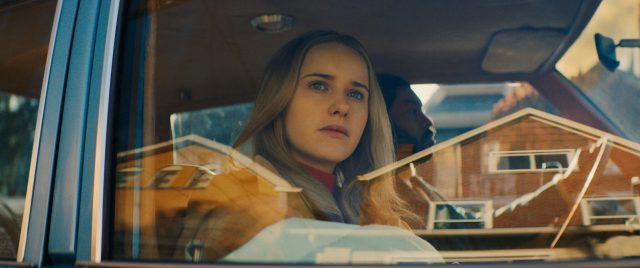I’m Your Woman: Touch the Things You Cannot Feel, by David Bax

Julia Hart is a director of such immediately evident skill, it’s hard not to worry that she’ll soon be another independent filmmaker who gets churned up in some major franchise assembly line. Truthfully, she already made her studio debut earlier this year with Disney’s Stargirl. But, with I’m Your Woman, her second feature of 2020, she proves that even while working in a commercial genre mode and with a considerable budget (the climactic car chase is thrillingly executed in its own right but all the more impressive for featuring multiple period-specific vehicles speeding through city streets fully dressed in 1970s production design), she remains a resolutely personal and passionate filmmaker.
I’m Your Woman is, in many ways, a classic “a girl and a gun” movie except, unlike most such examples, it’s actually about the girl. Rachel Brosnahan stars as Jean, who knows that her husband, Eddie (Bill Heck), is a criminal but remains in the dark about the specifics of his work and actions. Until one night, that is, when Eddie’s associate, Jimmy (Jarrod DiGiorgi), shows up in a panic, insisting that Jean needs to take her child and all the money Eddie has stashed in the house and go meet up with a man named Cal (Arinzé Kene) who will get her to a safe house to await further instructions. The rest of the film follows a classical mystery/suspense path but with a specific personality and distinct preoccupations. We’ve seen a million scenes in movies where a person learns to fire a gun, for instance, but Hart and Brosnahan concoct a palpable mixture of terror and power in that moment.
Hart’s screenplay, co-written with Jordan Horowitz, is just this side of hardboiled, more realistic than it is clever or quirky but maintaining the heavily weighted, pseudo-small talk of the form. In one memorable instance, a stranger’s casual observation that “At least it stopped raining” comes at the most gutting time possible.
It’s exciting, tense and often funny but I’m Your Woman has other, deeper concerns as well. While the film never overtly acknowledges the feminist movement of its decade, from the founding of Ms. magazine to the protracted battle over the Equal Rights Amendment, Jean’s position as a woman in this world is never far from front of mind. The most immediate question posed is whether the expected subordination of a wife in a patriarchal society precludes her from being complicit in her husband’s choices or, conversely, if that makes her all the more answerable to their consequences, fairness be damned.
More prominent a concern as I’m Your Woman proceeds, though, is Jean’s responsibility to the other male in her family, her infant son. The child is equal parts adorable and stress-inducing (it seems the only thing that could make having a gun to your head worse is if your kid won’t stop screaming the whole time). But Hart doesn’t treat him as a plot device or simply another facet of Jean’s predicament. In the film’s most touching scene, we see her attempt to teach her son what fire is and that it’s hot, a moment of parenting at its most primal. On the other hand, it’s weird to be reminded of a time when moms just regularly carried their babies in their laps in the passenger seat but, hey, it was the 70s.
Speaking of which, the fashions are terrific, especially when Jean trades her turtlenecks and floral prints for a big fur coat and sequined pants in order to, I guess, blend in among her husband’s cronies. With aesthetic choices like that and songs by Aretha Franklin, Richie Havens, Faces and more on the soundtrack, I’m Your Woman is as fun and thrilling as it is thoughtful.




























I switched lanes on the highway and the driver, this chaperone, said, ” You know, you were just going 110 miles an hour.”